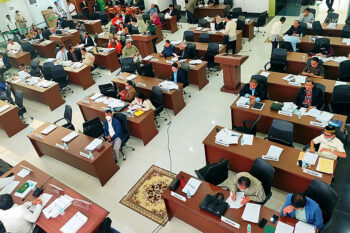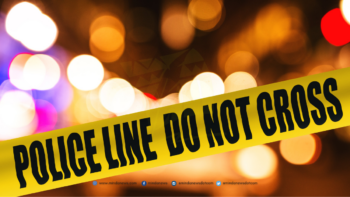On War vs. Drug
GENERAL SANTOS CITY, August 19, 2016 – In the first part of this “COMMENT” article last week, we noted at the end four major issues: (1) war against criminality and drug in disregard of human rights and rules of law; (2) federalization; (3) negotiating peace with the CPP/NPA/NDF; and, (4) implementing the peace agreements with the Moro rebels.
In this article, we will discuss the “(1)”; the “(4)” will be taken up in a separate series. Regarding the “(2)” and “(3)”, let’s wait for clear developments.
An Obsession
Ridding the Philippines of the drug menace was one major plank of his platform. By grimly revealing and vowing how he would wage the drug war, he could have lost the election; but he won. What he promised to do during his campaign was not a show off or threat; he is doing it right now – his election being invoked as his mandate to do so.
It is his obsession. He has repeatedly said he is staking his life, his honor and his presidency on this war. The killings and stern warning started before his proclamation and intensified after his inauguration on June 30.
He devoted a significant part of his SONA on the issue. In term of words, 18 percent of his 9,480-word; of time, 18 of the 98 minutes — five of his first 11 minutes; seven somewhere in the middle; and, six of his last seven minutes. What he told the Congress and the nation amounted to this: Of the many problems we are facing, the drug menace is the most daunting and has to be eradicated right now.
Grave Problem
The President must have presumed – and rightly so – that the members of the Congress and the rest of the nation are aware of the drug problem. Without delving in detail into the nature and evil effects of the drug menace, he stated that the solution of “the drug crisis that has engulfed — malawak (widespread) — the nation” he was puting in the hands of the police, the military and the local government executives particularly of the barangay chairmen – warning them, “Do not do drugs”.
He ordered what needs to be done – that to the police and the military implying “license to kill”. Warning them not to fail or betray their trust, he exhorted, “There will be no let-up in this campaign. Double your efforts. Triple them, if need be. We will not stop until the last drug lord, the last financier, and the last pusher have surrendered or that put behind bars or below the ground, if they so wish.”
Enormity
In warning the police, military, local government executives (LGEs), barangay chairmen and others in seats of power and authority “not to do drugs”, the President intimated his knowledge of the involvement in drug of many from their ranks. Since then, true to his vow, he has publicly revealed the names of police generals and other officials, LGEs, and judges involved in drug.
In the last seven minutes of his SONA, he cited statistics to show “the enormity of the problem of drug addiction”. Since July 1: 3,600 drug-related arrests done; 120,000 drug dependents surrendered, 70,000 of them pushers. He reiterated or elaborated some of the facts he had earlier revealed in the middle of his address.
Citing a report from the Philippine Drug Enforcement Agency: Two years ago, there were 3 million drug addicts in this country. Giving “it a liberal addition” of “700,000”, the number now is 3.7 million – “quite staggering and scary” a number.
Media reports, to some extent, corroborate the SONA citations:
Presidential spokesman Ernesto Abella cited statistics from the Dangerous Drugs Board: 99 percent of barangays in Metropolitan Manila and 27 percent of the nation’s 42,000 barangays affected by drug addiction; 1.3 million Filipinos using illegal drugs as reported in PDI (8/12: Senate summons Bato).
In a PDI 8/11 report, “No shortcut in Duterte war on drugs—Palace”, Presidential Chief Legal Salvador Panelo cited the number of surrenderees at approximately 600,000.
As of August 11, 2016, Philippine Daily Inquirer’s “Kill List” listed by names the 603 killed since June 30; 650 since May 10. In a PDI report (8/12: Senate summons Bato), the PNP number is lower – 449 from police operations against drug dealers since Mr. Duterte took office.
Foreign Cartels
Speaking extemporaneously in Tabgilish – a mix of English and Tagalog-Bisaya – he said the drug trade in the Philippines is run by foreign cartels. The so-called Filipino drug lords are just their distributors or franchised manufacturers. He did not specify which drug; he must not be referring to shabu, the most common in the market.
The foreign drug lords operate with advanced technology. The drugs manufactured in boats in international waters or in other countries are packed in drums rigged with satellite-based GPS (Geographical Positioning System) and thrown in coastal waters to be picked up by their contacts. “We are hard put sa (in) intelligence” to intercept them.
Last August 5, Duterte identified the cartels as the Sinaloa in Mexico and the Chinese Triad. They also use the Philippines as transshipment point of drugs. (The Philippine Star, August 5, 2016: Duterte says Mexico, China drug rings operating in Philippines)
Controversy with Critics
All, including Duterte’s outspoken critics, agree with the President in his crusade against drug. However, they oppose his means of doing it on grounds of his evident disregard of human rights, rule of law and due process. Joining them are international human rights institutions, agencies and advocates.
In this brief statement, he was applauded twice: “Human rights must work to uplift human dignity. [applause] But human rights cannot be used as a shield or an excuse to destroy the country — your country and my country. [applause].” He upholds human rights but sees its likelihood to be misused.
He is for the rule of law. “Lest I be misunderstood, let me say clearly, that those who betrayed the people’s trust shall not go unpunished and they will have their day in Court. [applause] And if the evidence warrants, they will have their day of reckoning too.” But his orders to the police to kill – seen as killing with impunity and abetting vigilantism – are contrary to the rule of law and the principles of human rights.
Different Views
Evidently, Duterte and his critics differ in their views. They all see the seriousness of the drug menace – in the Philippines, dating back to the last half of the past century. But they weigh differently the relevance of human rights and rule of law to the solution of the problem. This is the heart of the controversy.
Like Duterte, his critics want the drug menace eradicated but it should be with utmost observance of the rule of law, the due process and the principles of human rights in the apprehension and prosecution of violators of the anti-drug laws. However, they don’t see the irony. Past governments had campaigned against the trafficking and illegal use of drugs. Yet the problem worsened.
Duterte sees not only the utter failure of past anti-drug campaigns but also the irony of how the campaigns had worsened the problem. He sees the cause. The drug lords, their traffickers and pushers shielded by human rights and rule of law, create an environment where they ply their trade with impunity.
Different Actions
Past administrations were helpless. Under the rule of law and due process, anti-drug law violators can be prosecuted only after having been charged in court strictly following the due process; otherwise human rights would be violated.
So, drug lords buy protection from the police and influential politicians to evade apprehension; they hire lawyers who have no scruples in bending the law and due process — even to the extent of bribing judges – to subvert justice.
Drug addiction, per se, does not appear to be a crime – tolerated if it is. Unless, drug addicts commit crimes against person or property, they are not considered as criminals. This abets the expansion of the drug trade.
Duterte flushed out the drug lords, their traffickers and pushers including drug users. He ordered them to surrender or be arrested with the warning of being killed if they resist or evade arrest. He named drug lords and police generals, mayors, governors, members of Congress and judges allegedly involved in the drug trade or dispensing protection. They, too, were ordered to submit to investigation.
In ignoring human rights, Duterte denied drug lords, traffickers and pushers their shields against apprehension and prosecution. He disarmed and cowed them to submission with his “name-and-shame” and “shoot-to-kill” approach. He refused to be drawn into the dilemma of the past administrations.
Different Premises
Duterte’s order shocked the drug world. Since May 10, thousands have surrendered including users with hundreds killed – by the police for allegedly resisting arrest and by vigilantes. This to his critics is justifying the end with the means.
His critics hold that human rights are inviolable. All persons suspected of any crime are presumed innocent under the bill of rights until proven guilty — their human rights to be respected. They enjoy the protection of law and due process from apprehension through prosecution and of human rights even after conviction.
On this premise, the human rights of drug lords, traffickers, pushers and users must be respected; Duterte is wrong in ignoring these rights in his crackdown on drug trade and addiction.
Likewise, Duterte upholds the primacy of human rights: “…my administration shall be sensitive to the State’s obligations to promote, and protect, fulfill the human rights of our citizens, especially the poor, the marginalized and the vulnerable and social justice will be pursued even as the rule of law shall at all times prevail. … [It] shall implement a human approach to development and governance, as we improve our people’s welfare in the areas of health, education, adequate food and housing, environmental preservation, and respect for culture.”
He was applauded twice when he said: “Human rights must work to uplift human dignity. But human rights cannot be used as a shield or an excuse to destroy the country — your country and my country.” Were the applauses in appreciation of his view concerning the contrary roles of human rights ?
His view was: Human rights are a double-edged tool – either as a means to uplift human dignity or to destroy the country. In the first, human rights must be upheld; in the second, they must be denied.
Zeroing in on Drug Menace
Respect human rights without exception, critics tell Duterte. Do the same with rule of law and due process. There must be exceptions, he counters. Those who violate the rights of others are in default of respect for their rights.
Do his critics see his moral sense? Drug dehumanizes; it destroys the humanity of any person. Drug lords, their associates and protectors responsible for leading more than three million Filipinos to drug addiction have defaulted on their human rights. They should not be allowed to continue using their human rights to evade apprehension, to subvert the rule of law and due process, to dehumanize more Filipinos and “to destroy the country”.
While he upholds the primacy of human rights in reference to the rights of the innocents, he withholds these together with the rule of law and due process in reference from drug lords, their associates and protectors to deny them protection from apprehension. Whatever rights and privileges they are still entitled to they can avail of during their prosecution and imprisonment if convicted.
Critical Question
Savage! Ruthless! That’s Duterte’s war against all involved in the drug trade as well as against their victims, the drug addicts. His dual strategies: For the lords, traffickers, pushers and addicts, “Shoot-to-kill” if they resist or evade arrest; to flush out top lords and their alleged supporters among the top echelons of the PNP, the local government unit executives, the Congress and. judges, “name-and-shame”.
Rallying the Local Government officials and the Philippine Nation Police behind him, he vowed, “We will not stop until the last drug lord, the last financier, and the last pusher have surrendered or [been] put behind bars or below the ground, if they so wish.”
Can he win his war?
To achieve meaningful victory, the drug trade must be completely stopped – all drug addicts rehabilitated to become social and economic assets for the country. This means the Philippines will be drug-unfriendly if not completely drug-free.
Can President Duterte, the local government unit executives and PNP do this alone?
Our anti-drug laws must be adequate to cope with the drug menace. This calls for the amendment or revision of our anti-drug laws and the enactment of new laws as the need demands. Only the Congress can do this. But at present, President Duterte and his top lieutenants are averse to the Senate investigation in aid of legislation of the killings in the light of human rights and rule of law.
As the President himself said in his SONA international drug cartels are behind the drug trade in the Philippines. To block these cartels, international cooperation and assistance are necessary. But President Duterte, this early in his presidency, has manifested little knack for diplomacy.
The rehabilitation of the millions of drug addicts may need assistance from international agencies and funding institutions. But President Duterte is contemptuous of the United Nations for opposing his anti-drug war and of the US ambassador in Manila for minding his foul language during Philippine election – sending wrong signals to the international community.
That President Duterte has emerged to wage war against drug menace is a blessing. He needs to unite all government machineries and resource behind his war and listen to all criticisms. But he is sensitive; instead of welcoming criticisms, he defied his top critics – Senator Leila de Lima in the Senate and Chief Justice Lourdes Sereno in the Supreme Court. He SHOULD NOT be vindictive like what he claimed not to be in his SONA.
To repeat the critical question: Can Duterte win his war? From what happens in the first 100 days of his administration, the answer can be drawn.







